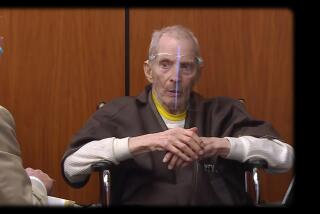Dispute Over Lawyer Stalls Overton Trial : Courts: Attorney’s health, clash with defendant raise specter of mistrial in sensational O.C. murder case.
- Share via
SANTA ANA — The sensational murder trial of Richard K. Overton, who is accused of poisoning his wife with cyanide, has been recessed 10 months without public explanation partly because his attorney suffered a severe depression that cast doubt on the adequacy of Overton’s defense.
The lengthy delay was also imposed by the trial judge when Overton’s attorney, in a confidential hearing, said he believed his client had given “untrue” testimony and might have tampered with evidence, according to legal documents obtained by The Times.
Those issues and others in the high-profile case have resulted in at least 20 confidential court hearings since the trial was halted last July. Since then, the trial judge has denied a mistrial and stymied Overton’s attempt to fire his attorney. But the issues are now being considered in secret by the 4th District Court of Appeal in Santa Ana.
The mysterious trial delay and confidential hearings are the latest developments in the five-year drama stemming from the January, 1988, death of Janet L. Overton, a popular Capistrano Unified School District trustee who collapsed at her Dana Point home and died, allegedly of cyanide poisoning.
After the case languished as an unexplained death for six months, sheriff’s deputies launched one of their longest murder investigations ever when Overton’s first wife told them that he had tried to poison her in the early 1970s. Three years after Janet Overton’s death, Richard Overton was charged with first-degree murder. His case went to trial in June of last year.
During their lengthy investigation, deputies became aware of marital discord between the Overtons and lurid details about their personal lives, including that Richard Overton kept diaries detailing his wife’s suspected love affairs and his efforts to spy on her.
Since the courtroom proceedings were interrupted, Superior Court Judge David O. Carter has attempted to salvage months of preparation and a half-completed trial. He has grappled with legal attacks on the competency of defense attorney Robert D. Chatterton, whom Overton wants to fire, and who asked last July to be relieved because of his health.
Chatterton says he has since recovered fully, and wants to remain on the case.
Meanwhile, it has been more than nine months since the jury has heard testimony in the case, and it is debatable whether the individual jurors can accurately remember much of the testimony they heard before the trial’s recess, which was called just as the defense began presenting its case.
“This is such a highly unusual thing,” said Samuel Frizell, a law professor at Western State University’s College of Law in Fullerton and an expert on juries. “I think they’re going to have to start over. Can you remember things that went on 10 months ago?”
All of this has raised the possibility of a mistrial in a complex and expensive case--estimated to have already cost at least $1 million--that could send the 64-year-old defendant to prison for life if he is convicted.
The complications now facing the court are described in legal documents filed by Jack M. Earley, a lawyer appointed by Judge Carter to represent Overton’s interests in the protracted hearings over issues of legal conflicts and competence.
In that role, Earley has asked the Santa Ana appeals court to declare a mistrial and allow Overton to dismiss Chatterton. The matter, which has been kept confidential, is set for a hearing this month.
“This case represents the most aberrant miscarriage of justice,” Earley argued in legal documents. “In order to fit some notion of judicial economy, the . . . court fashioned a trial in which (Overton)is totally deprived of his right to a fair, accurate and reliable determination of his guilt.”
Carter, who has sealed records of the proceedings because of the sensitive issues related to Chatterton’s health and his conflicts with Overton, declined to comment on the case. Earley also would not discuss the situation.
According to documents obtained by The Times, Chatterton first complained of mental problems last June 30, less than three weeks into the trial. At that time, he privately told the judge that he had “reached a state of mental exhaustion where I don’t have a clue about what I’m doing.”
In a tearful statement, Chatterton said, “Ultimately, the bottom line is I don’t think I can represent Mr. Overton. I am so embarrassed.”
“It’s OK. There is nothing wrong with crying,” replied Carter, who praised Chatterton for his legal acumen. “Your mastery in presentation up to this point has been fabulous,” the judge was quoted as telling him in transcripts of the confidential hearings.
Despite Chatterton’s concerns, the trial continued until he approached the judge a second time on July 23 with a complaint that he might have a conflict with his client. Chatterton asked to be removed from the case because he was concerned that Overton may have lied on the witness stand about a piece of evidence.
While the matter was being discussed, Overton suffered what was initially thought to be a heart attack and had to be removed from the courtroom on a gurney by paramedics. It later turned out to be an anxiety attack.
The day before the interruption, Overton had undergone a blistering cross-examination by Deputy Dist. Atty. Christopher J. Evans and admitted that he had tried to adulterate the coffee of his first wife, Dorothy Boyer, with prescription drugs. It was a “neat joke,” he told the jury.
The admission was significant for the prosecution, which contends that Overton tried to poison a former wife. The damaging statements were the last testimony jurors heard before Carter told them, without explanation, that he was postponing resumption of the trial for two months.
Behind the scenes, the judge was trying to reconcile Chatterton’s worries about Overton’s testimony regarding a selenium rectifier, a simple electronic device found in many household appliances that contains a potentially lethal chemical.
The prosecutor contends that Overton tried unsuccessfully to slowly poison his wife Jan with small doses of selenium before killing her with cyanide because he was jealous of her extramarital affairs.
On the witness stand, Overton had said that a selenium rectifier he had given to Chatterton before the trial was not the same as the one the attorney presented to the court at trial, leaving the implication that Chatterton had switched the evidence.
Legal documents quote Chatterton as telling the judge that he had not tampered with the rectifier. He said he believed that Overton had given “untrue” testimony and might have even switched the evidence himself while it was stored at his law office.
The dispute confronted the judge with the discomfiting possibility that Chatterton might have to testify against his own client, presenting a legal conflict that would force the lawyer’s resignation from the case. The judge also worried that the information might unfairly impact the prosecution’s case.
At a conference in the judge’s chambers with the prosecutor excluded, Overton looked again at the rectifier in question and said his original testimony might have been wrong.
Although Overton acknowledged that he might have made a mistake, the legal documents state that Overton was concerned that Chatterton harbored ill will toward him over the rectifier issue and could no longer represent him adequately.
But on Aug. 10, Carter decided there was no conflict and ordered that the trial resume on Sept. 29. The judge, however, was still concerned about Chatterton’s mental health and wanted to meet with him on Aug. 24. At that court session, Carter allowed two other lawyers to assist Chatterton in the case.
On Sept. 8, one of those attorneys, George A. Peters, told the judge that Chatterton was hospitalized and placed on a suicide watch because of a “life-threatening severe depression.” In an interview on Friday with The Times, Chatterton said he remained in the hospital 16 days, but never contemplated suicide.
Peters told Carter that Chatterton would need at least four months to recuperate. He also said that “experts” had reported some time earlier that Chatterton had difficulty absorbing and retaining information.
The day before the trial was to resume, Chatterton’s doctor told Carter that the veteran attorney was suffering “a major depressive disorder with panic attacks and anxiety.” He also noted that his patient had “very poor concentration and suicidal thoughts.”
According to the legal records, Dr. Stephen Wyman said that Chatterton had a good chance of recovery, but needed at least a year before he could once again tackle a very complicated case.
A day later, Chatterton told the court, “My position is that I’m being asked to sacrifice my health for the sake of Mr. Overton’s case, and I’m just not willing to do that. . . . It seems to me, just basic, that if I can’t put my client’s interest first over mine, I have no business being his lawyer.”
In addition, Overton informed Carter that he had lost confidence in Chatterton and wanted to fire him.
Once again, the judge postponed resumption of the trial, this time until March.
On Nov. 19, the legal records state, Carter appointed attorney Earley to review the unusual situation and act on Overton’s behalf during his dispute with Chatterton.
At some point in the proceedings, Overton’s $300,000 fee to Chatterton was exhausted, and the court agreed that all three of his attorneys would be paid at taxpayer expense.
In later court sessions, legal documents show that Earley complained to the judge that Chatterton’s condition might have affected his ability to represent Overton during the trial. He further alleged that Chatterton breached his duty to keep conversations with his client confidential when he approached the judge about the selenium rectifier issue.
According to legal documents, Carter then undertook a review of the trial transcripts. He eventually concluded that Chatterton had done a good job despite his mental health problems and wanted him to carry on as long as he felt able.
During the review, Chatterton underwent treatment, which included antidepressive drugs. His doctors noted that he was making remarkable progress, the legal records show.
“Mr. Chatterton did an exemplary job up until the time of the recess in the trial occasioned by his illness,” Carter said at a hearing Jan. 12. “It’s apparent that Mr. Chatterton, in this court’s opinion, is fully recovered. . . .”
However, in the appeal filed by Earley, he raised the issue of Carter’s longtime friendship with Chatterton, who was once his boss when both served in the Orange County district attorney’s office.
In the interview Friday, Chatterton, 54, told The Times that at first he thought his condition was exhaustion and that he simply needed a rest. But as the trial continued, his mental health worsened. On Aug. 24, he said, he was finally diagnosed with severe depression.
He said he hospitalized himself because he thought it was the quickest route to recovery from what turned out to be a chemical deficiency in his system. Chatterton said that he never tried to kill himself during his illness, which his doctors successfully treated with medication.
“Do I think I was doing a bad job? No,” Chatterton said, assessing his performance for Overton. “Do I think I could have done a better job had this condition not occurred?Sure. I was not at my regular level. . . . Not at a level that (Overton)has a right to expect, and that I expect from myself. “
Chatterton told The Times that he now feels fully recovered, something confirmed in court records by his physician. He said he is eager to return to the courtroom. “I don’t have any hesitation about going back to trial.”
Chatterton said he was concerned that someone within the court system might have leaked confidential legal records about the case to The Times to sabotage the trial. “This is a disservice to the system. It is best to deal with this under seal. When this (case) is all over, justice will prevail.”
During one of the recent closed-door hearings in his chambers, Judge Carter praised Chatterton’s work, stating that “at all times (his) performance on behalf of the defendant has been well above the generally accepted standard of performance in the community.”
Nevertheless, Earley filed a motion for mistrial with the 4th District Court of Appeal, alleging that Overton did not have the adequate legal representation he was entitled to under the U.S. Constitution.
Earley further questioned whether jurors would be able to fulfill their legal obligation because of the long adjournment.
Chatterton was not relieved sooner in the case, Earley wrote in legal documents, “because the trial court was desperate to keep the trial on some sort of schedule. . . . Secondly, the trial court’s personal relationship with and concern for attorney Chatterton improperly outweighed its consideration for (Overton’s)rights to a fair trial and to assistance of conflict-free counsel.”
The appellate court denied the motion without a hearing, and Earley appealed to the state Supreme Court. The high court, however, sent the matter back to the appeals court for a full hearing.
That court is expected to rule in the coming months, but it is uncertain whether details of the decision will also be sealed from public view.
More to Read
Sign up for Essential California
The most important California stories and recommendations in your inbox every morning.
You may occasionally receive promotional content from the Los Angeles Times.














